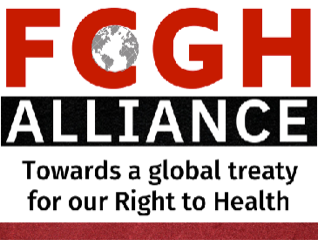The Case for a Framework Convention on Global Health
Giandomenico Barcellona
Translated from from Italian by Capucine Barcellona.
There are at least two fundamental reasons to promote the creation of a Framework Convention on Global Health. First, health constitutes the main good for every individual on earth and therefore, from a basic perspective of human solidarity, it must be ensured for all: without the right to health there is no freedom.
The second reason–less evident but no less important–consists of the fact that, in the absence of regulation on the matter in the context of the major international charters on human rights, there could be a distortion of the concept of health on the part of States, altering it from the protection of an individual’s rights to its use as a means of social governance.
With the acceleration of technological progress this danger–which is not a new problem but a consequence of modernity itself–has shown itself potentially capable of resulting in thecompression of the right to freedom in the name of an abstract and excessively collectivized concept of health.
Indeed, it is easy to observe how biopolitics (Foucault, 1979) has gradually expanded to occupy spaces once considered unreachable. This phenomenon has grown even more since security (not without reason) became part of the concept of health, so much so that topics such as prevention, precaution, and the conflict between freedom and security are being increasingly discussed. Risk management has become so relevantthat the term risk society has been coined(Beck, 1992).
The definition of health found in the preamble of the WHO Constitution (“Health is a state of complete physical, mental and social well-being and not merely the absence of disease or infirmity“) immediately reveals how all-encompassing the concept of health is, and thus how penetrating the WHO’s area of authority can become. It is therefore unsurprising that the WHO itself–in part due to its greater leanness and incisiveness as compared to the UN–lends itself to being, if not put itself forward as, the main body of global governance.
Nonetheless, it must be recognized that we are searching for a very delicate balance: there is no doubt that in a complex and interdependent world, increasing attention must also be paid to public health, which is certainly not (only) a policy of control but also an actual need. It is thus certainly correct to state that alongside individual rights, there are also social duties.
From this perspective, an international treaty on the right to health could hopefully ensure the achievement of the effectiveness of individuals’ right to health, representing a balance between the guarantee of aboundary to the power of action of States (so that their action is truly directed to the protection of individuals and does not become a means of biopower) and the real need for public health policies.
Certainly, like any rule that posits itself as a source of higher-ranking law, such a treaty runs the risk typically inherent to any centralistic legislation: that in the event of incorrect functioning of or poor decision-making from the source or central body, there is no longer any escape route. In other words, there is a risk that this treaty will become the instrument for carrying out what it is intended to avoid.
Nonetheless, it must be taken into account that the origin and history of international human rights charters is a history of limits to abuses by States; that these charters have always tried to balance the various conflicting interests that arise in concrete situations, and in this, they have always paid particular attention to the right to freedom that, ultimately, today the strength of States and the danger of the compression of (or lack of protection for) fundamental rights by the latter are much stronger than the apprehension toward oppressive actions by supranational authorities.
Therefore, the best guarantee appears to bethat of working toward proper institutional architecture and supranational regulation that functions as a balance to local powers, while at the same time leaving room for regulation at a lower level when this is preferable, in a correct balance between powers and counterpowers.
Yet even if one were to disagree with the above considerations, emphasizing the danger that centralization entails, it should be noted that the best method to eliminate this danger (or at least moderate it) is certainly not to pretend that it does not exist: to not participate in an ongoing process does not mean that the process does not happen regardless. Participatory absence translates only into insignificance and into the impossibility of influencing choices.
In fact Rodrik’s trilemma (2011) – according to which globalization, national sovereignty and democracy cannot coexist all together – currently seems to place the latter in a recessive position.
It is therefore necessary, within global decision-making processes, for there to be a proxy for democracy which today exists exclusively in activism and participation from civil society. Thus, as widespread and informed a debate as possible is desirable.
In this context, a global health treaty can prove to be a powerful tool for achieving the right to health for all, ensuring balance, accountability, participation, and respect for fundamental rights. Such that there is no contradiction between values that are commonly expressed (and which we claim to protect) and the real world.
References
Beck U. (1992), Risk Society: Towards a New Modernity, London: Sage Publications
Foucault M. (1979), La naissance da la biopolitique Cours au Collège de France (1978-1979), Gallimard Seuil
Rodrik D. (2011), The Globalization Paradox: Democracy and the Future of the World Economy, Norton & Company, Inc
Giandomenico Barcellona is a member of the FCGH Alliance. He is an attorney in Rome (Italy) and expert in health systems organisation, Giandomenico Barcellona specialises in Italian private and public national health law, international health law, medical malpractice and bioethics. He has authored books and publications in legal and topical journals and has lectured at specialised university courses and countinuing medicaal education courses.

